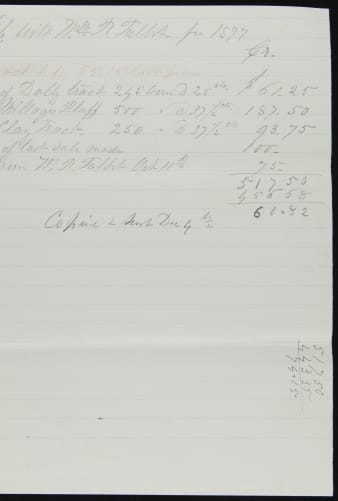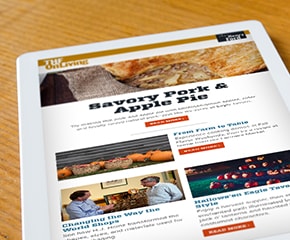
General Personal Records Series
The Henry Ford Office was created in 1906 by James Couzens to manage Henry Ford's correspondence and personal affairs. The General Personal records series contains material from the Henry Ford Office related to many of Henry Ford's non-automotive business and personal interests.
Biographical / Historical Note
Ford Motor Company was founded in 1903. In 1906, James Couzens, at the time general manager and one of the company's first stockholders, organized the Henry Ford Office to manage Ford’s correspondence and personal affairs. By 1911, E. G. Liebold had...
MoreFord Motor Company was founded in 1903. In 1906, James Couzens, at the time general manager and one of the company's first stockholders, organized the Henry Ford Office to manage Ford’s correspondence and personal affairs. By 1911, E. G. Liebold had become personal secretary to Henry Ford, and in addition to some company duties, largely took over the administration of Henry's affairs. As the company's size increased, functionally specialized departments were created for handling company activities and records. As early as 1916, income tax records reveal the beginnings of the Henry Ford Office as an independent entity distinct from the Ford Motor Company. Between 1919 when Henry Ford resigned as president of Ford Motor Company until his death in 1947, the Office of Henry Ford managed his wide-ranging personal interests and non-Ford Motor Company businesses. In 1922, Frank Campsall transferred from Ford Motor Company's Highland Park Plant to work in the Henry Ford Office, and he eventually became Henry's personal secretary. Because of Henry Ford's continued involvement in Ford Motor Company, the office also handled many company matters.
With the overwhelming success of the Model T, Henry Ford amassed a huge fortune that allowed him to turn his attention toward pursuits other than the automobile with little regard to their costs. The publicity generated from his announcement of the five-dollar day in January, 1914, ensured that his personal or business ventures would be topics of national interest. These ventures included aviation, hydroelectric power, industrial decentralization, industrial agriculture, health and wellness, dancing, politics, education, and public history. Records related to several of these interests are included in the Personal Topics Subject File Subgroup.
LessScope and Content Note
The General Personal records series contains material related to many of Henry Ford's nonautomotive business and personal interests. The series includes subject files, correspondence, genealogy records and research material, proclamations and awards,...
MoreThe General Personal records series contains material related to many of Henry Ford's nonautomotive business and personal interests. The series includes subject files, correspondence, genealogy records and research material, proclamations and awards, and scattered financial records. The material offers insight into the interests and activities of Henry Ford and his place in society in the first half of the twentieth century. A number of documents from this series were used between 1952 and 1954 by Allan Nevins and Frank Ernest Hill in research for their three volume history of Ford Motor Company. These documents were retained as Acc. 572 rather than being returned to their original locations and cross references are provided as appropriate.
The General Personal records series consists of eleven subseries: the Name files subseries, the Subject files subseries, the Article files subseries, the Documents, notes, and publications subseries, the Ford genealogy files subseries, the Bryant genealogy files subseries, the Bound financial records subseries, the Anti-cigarette literature and correspondence subseries, the Framed documents subseries, and the Oversize materials subseries.
The Name files subseries, 1886-1948 (2.8 cubic ft.), is comprised largely of correspondence, telegrams, publications, postcards, and greeting cards sent to Henry Ford or his secretaries (mainly Frank Campsall or E. G. Liebold) in regard to topics of interest to Mr. Ford or as congratulatory messages for various birthdays or anniversaries. Most of this material is related to interests outside of the manufacture of automobiles, but there are some materials that cover that topic as well, including some Ford Motor Company correspondence and correspondence from Percival Perry and Gaston Plantiff. Also included are a few subject files that cover various topics of interest to Henry Ford during the 1900s and 1920s. This subseries is arranged alphabetically by correspondent or subject name.
The Subject files subseries, 1823-1944 (4.0 cubic ft.), contains clippings, photographs, cards, telegrams, publications and sheet music for subjects of interest to or relating to Henry Ford, including personal notes, birthday and holiday greetings, a copy of the 1896 payroll log for the Edison Illuminating Company with an entry for Ford, and collected material on interests such as dancing, food and diet, and rubber. There are several documents and maps in the Georgia folders ranging in date from 1823 to 1880 that presumably document the area that would later become his Richmond Hill property in Georgia. Included with that material is an 1823 slave list from White Hall and correspondence of G. L. Appleton and R. J. Arnold. Other items of interest include lists of salaried and hourly Ford Motor Company employees with 20 or more years of service in 1942. This subseries is arranged alphabetically by subject term or by name of individual.
The Article files subseries, 1870-1950 (0.4 cubic ft.), includes typescripts and articles about Henry Ford and topics or persons of interest to him including children, agriculture and industry, and world affairs. Most of the typescripts are unattributed, but they appear to be written by Henry Ford or members of his staff. The series is arranged alphabetically by article title.
The Documents, notes, and publications subseries, 1914-1944 (3.2 cubic ft.), includes a box of Henry Ford's personal notes or jot books. The notes can be difficult to read, and the books contain many blank pages. Other materials of note include magazines and pamphlets saved by the Office of Henry Ford, 1939-1942, daily newspaper clippings related to Henry Ford or Ford Motor Company dating from 1937 to 1940, and Ford News proofs from 1942.
The Ford genealogy files subseries, circa 1834-1947 (2.2 cubic ft. and 1 oversize box), and Bryant genealogy files subseries, 1886-1927 (1.2 cubic ft.), consist mainly of information compiled by genealogical researcher Gladys M. Salta about the lineage of the Ford and Bryant families.
The Bound financial records subseries, 1914-1925 (0.4 cubic ft.), includes three ledgers with scattered accounting information on such entities as the Ford Hawaiian Quintet and Sialia yacht. The ledgers are incomplete and not especially informative.
The Anti-cigarette literature and correspondence subseries, 1912-1915 (0.2 cubic ft.), includes several copies of the four-volume series "The Case against the Little White Slaver," correspondence regarding that publication, and printed material about cigarettes.
The Framed documents subseries, 1928-1947 (0.2 cubic ft.), contains four items: a 1947 resolution by the Board of the Wayne County Road Commissioners to the family of Henry Ford, 1928 letters from France M. Leslie and Isabella C. Leslie to Clara Ford, a copy of a 1942 George Washington Carver letter to Frank Campsall, and a 1944 letter to "Mr. Lambe" from the President of the Chamber of Commerce of the United States regarding a statement by Stalin that Henry Ford was one of the world's greatest industrialists.
The Oversize materials subseries, 1859-1947 (8 oversize boxes), contains a scrapbook of clippings about Henry Ford; a series of Resolutions presented upon his death; Honorary Degrees; Awards and Citations and honorary Membership Certificates from a variety of organizations; bound financial records that include a record of vouchers issued from 1912 to 1917 for Valley Farm, Inc., cash books for Henry Ford Estates from 1914 to 1916 and Henry Ford & Son purchase records from 1916 and such varied items as a 1943 framed color lithograph of Henry Ford by Irving Bacon; a photograph of the September 2, 1945, Japanese surrender on the U.S.S. Missouri signed by Admiral Nimitz; and specifications of Kilnagross Church, the Ford family ancestral church in County Cork, Ireland.
LessCollection Details
Object ID: 64.167.23.0
Creator: Ford, Henry, 1863-1947
Inclusive Dates: 1823-1984
Size: 14.6 cubic ft. and 8 oversize boxes
17.95 cubic ft. (41 boxes) [from Collection Survey]
Language: English
Collection Access & Use
Item Location: Not Currently On Exhibit
Access Restrictions: The series is open for research.
Credit: From the Collections of The Henry Ford. Gift of Ford Motor Company.
Keywords
United States, Georgia, Fort McAllister
United States, Georgia, Richmond Hill
United States, Michigan, Dearborn, Camp Legion
United States, Michigan, Ypsilanti Township, Camp Willow Run
Blueprints (Reprographic copies)
Clippings (Information artifacts)
Avery, Clarence W. (Clarence Willard), 1882-1949
Buchman, Frank Nathan Daniel, 1878-1961
Carver, George Washington, 1864?-1943
Correll, Charles J., 1890-1972
Coughlin, Charles Edward, 1891-1979
Edison, Thomas A. (Thomas Alva), 1847-1931
Hearst,William Randolph, 1863-1951
Meadowcroft, Wm. H (William Henry), b. 1853
Roosevelt, Franklin D. (Franklin Delano), 1882-1945
Trowbridge, J. T. (John Townsend), 1827-1916
Digitized Artifacts From This Collection
In many cases, not all artifacts have been digitized.
Contact us for more information about this collection.
Ford English School Diploma, 1914-1915
Artifact
Diploma
Date Made
1914-1915
Summary
In 1914, Ford Motor was hiring workers in droves. Many were immigrants who could not read or write English and were unable to carry out instructions. Henry Ford organized classes in English. These lessons also included instruction in United States naturalization requirements which led over 6,000 Ford employees to obtain diplomas accepted by U.S. emigration officials resulting in eventual citizenship.
Keywords
Object ID
64.167.23.13
Credit
From the Collections of The Henry Ford. Gift of Ford Motor Company.
Location
By Request in the Benson Ford Research Center
Get more details in Digital Collections at:
Ford English School Diploma, 1914-1915
What is The Henry Ford?
The national attraction for discovering your ingenuity while exploring America’s spirit of innovation. There is always much to see and do at The Henry Ford.
Letter from Samuel Arnold to George Appleton, December 3, 1876
Artifact
Letter (Correspondence)
Date Made
03 December 1876
Place of Creation
Keywords
United States, Rhode Island, Providence
United States, Georgia, Bryan county
Appleton, George L., 1841-1904
Object ID
64.167.23.22
Credit
From the Collections of The Henry Ford. Gift of Ford Motor Company.
Location
By Request in the Benson Ford Research Center
Get more details in Digital Collections at:
Letter from Samuel Arnold to George Appleton, December 3, 1876
What is The Henry Ford?
The national attraction for discovering your ingenuity while exploring America’s spirit of innovation. There is always much to see and do at The Henry Ford.
Receipt for Services Rendered Recording Probates for the Arnold Family, 6 April 1877
Artifact
Receipt (Financial record)
Keywords
Object ID
64.167.23.28
Credit
From the Collections of The Henry Ford. Gift of Ford Motor Company.
Location
By Request in the Benson Ford Research Center
Get more details in Digital Collections at:
Receipt for Services Rendered Recording Probates for the Arnold Family, 6 April 1877
What is The Henry Ford?
The national attraction for discovering your ingenuity while exploring America’s spirit of innovation. There is always much to see and do at The Henry Ford.
Receipt of Payment for Certified Copies of Deeds to Silk Hope Plantation, June 11, 1877
Artifact
Receipt (Financial record)
Keywords
United States, Rhode Island, Providence
United States, Georgia, Bryan county
United States, Georgia, Richmond Hill
Object ID
64.167.23.32
Credit
From the Collections of The Henry Ford. Gift of Ford Motor Company.
Location
By Request in the Benson Ford Research Center
Get more details in Digital Collections at:
Receipt of Payment for Certified Copies of Deeds to Silk Hope Plantation, June 11, 1877
What is The Henry Ford?
The national attraction for discovering your ingenuity while exploring America’s spirit of innovation. There is always much to see and do at The Henry Ford.
Letter from William Talbot to George Appleton, July 16, 1877
Artifact
Letter (Correspondence)
Creators
Place of Creation
Keywords
United States, Massachusetts, Northampton
United States, Rhode Island, Providence
United States, Georgia, Bryan county
United States, Georgia, Liberty County
Object ID
64.167.23.34
Credit
From the Collections of The Henry Ford. Gift of Ford Motor Company.
Location
By Request in the Benson Ford Research Center
Get more details in Digital Collections at:
Letter from William Talbot to George Appleton, July 16, 1877
What is The Henry Ford?
The national attraction for discovering your ingenuity while exploring America’s spirit of innovation. There is always much to see and do at The Henry Ford.




Agreement for the Purchase of Ossabaw Island by George Appleton from Alexander McDonald, November 1, 1877
 Details
Details
Agreement for the Purchase of Ossabaw Island by George Appleton from Alexander McDonald, November 1, 1877
Artifact
Agreement
Date Made
01 November 1877
Place of Creation
Keywords
United States, Georgia, Floyd county
United States, Georgia, Ossabaw Island
Object ID
64.167.23.37
Credit
From the Collections of The Henry Ford. Gift of Ford Motor Company.
Location
By Request in the Benson Ford Research Center
Get more details in Digital Collections at:
Agreement for the Purchase of Ossabaw Island by George Appleton from Alexander McDonald, November 1, 1877
What is The Henry Ford?
The national attraction for discovering your ingenuity while exploring America’s spirit of innovation. There is always much to see and do at The Henry Ford.
Record of George Appleton's Account with William Talbot, 1877
Artifact
Account
Creators
Keywords
Object ID
64.167.23.40
Credit
From the Collections of The Henry Ford. Gift of Ford Motor Company.
Location
By Request in the Benson Ford Research Center
Get more details in Digital Collections at:
Record of George Appleton's Account with William Talbot, 1877
What is The Henry Ford?
The national attraction for discovering your ingenuity while exploring America’s spirit of innovation. There is always much to see and do at The Henry Ford.
Letter from William Bailey to George Appleton, February 21, 1880
Artifact
Letter (Correspondence)
Date Made
21 February 1880
Creators
Place of Creation
Keywords
United States, Georgia, Bryan county
United States, Rhode Island, Providence
Object ID
64.167.23.54
Credit
From the Collections of The Henry Ford. Gift of Ford Motor Company.
Location
By Request in the Benson Ford Research Center
Get more details in Digital Collections at:
Letter from William Bailey to George Appleton, February 21, 1880
What is The Henry Ford?
The national attraction for discovering your ingenuity while exploring America’s spirit of innovation. There is always much to see and do at The Henry Ford.



Program, "First Annual Concert and Ball," with Music by Henry Ford's Old-Time Dance Orchestra," 1926
 Details
Details
Program, "First Annual Concert and Ball," with Music by Henry Ford's Old-Time Dance Orchestra," 1926
Artifact
Program (Document)
Date Made
30 January 1926
Summary
Henry Ford's revival of early American dancing encouraged others to join in. In January 1926, members of Detroit's Twentieth Century Club held a ball featuring the old-fashioned dances. Most everyone came in period costume. Henry and Clara Ford looked elegant in their "old fashioned" garb--Henry in a waistcoat and vest, and Clara with a pink silk gown and her hair dressed in side curls.
Place of Creation
Keywords
Lovett, Benjamin B., 1876-1952
Lovett, Benjamin B., Mrs. (Charlotte)
Object ID
64.167.23.1
Credit
From the Collections of The Henry Ford. Gift of Ford Motor Company.
Location
By Request in the Benson Ford Research Center
Get more details in Digital Collections at:
Program, "First Annual Concert and Ball," with Music by Henry Ford's Old-Time Dance Orchestra," 1926
What is The Henry Ford?
The national attraction for discovering your ingenuity while exploring America’s spirit of innovation. There is always much to see and do at The Henry Ford.


















